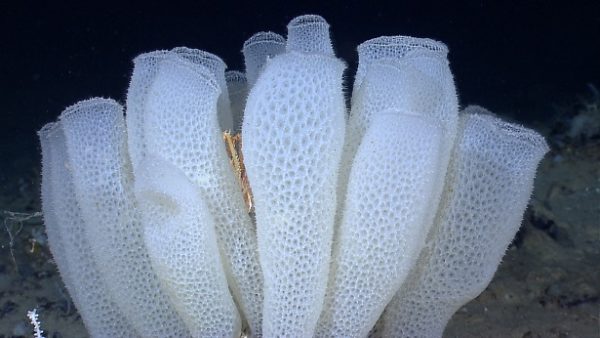
 Marine biologists at the University of Alberta are working to protect rare glass sponge reefs off the BC coast and starting this month, they’ll be live streaming segments of their mission from deep underwater in the Hecate Strait near Haida Gwaii, BC.
Marine biologists at the University of Alberta are working to protect rare glass sponge reefs off the BC coast and starting this month, they’ll be live streaming segments of their mission from deep underwater in the Hecate Strait near Haida Gwaii, BC.
One of Canada’s unique marine ecosystems, the glass sponge reefs were discovered some 30 years ago, just this past February receiving marine protect area status from the federal government, which restricts fishing within the area. Along with a reef discovered off the coast of Washington State in 2007, the four reefs in the BC marine protected area represent the only known examples of glass sponge reefs in the world, these ones thought to be over 9,000 years old. Before their discovery, scientists had believed the species to have gone extinct in the Jurassic Period 200,000 years ago.
“They are…very unusual,” says Sally Leys, and evolutionary biologist and scientific lead for the expedition, to Radio Canada International. “This veneer of tissue that is on the skeleton is one giant cell. This cell has many nuclei and those nuclei travel around on basically railroad tracks around the whole animal. And because it’s a giant cell it has no barriers to electrical signalling so in fact…this group of sponges can send electrical impulses throughout the whole animal.”
Leys’ lab will be using a Remotely Operated Vehicle (ROPOS) to explore the reefs, providing a blog and live stream video of their work as they go along. “Because they are so deep and so remote, opportunities to study them have been few and far between,” said Alexandra Barron, the ocean conservation manager for the Canadian Parks and Wilderness Society in B.C., to CBC News. “Live streaming this expedition brings the public the opportunity to see these sponge reefs come to life before their eyes and actually see what the scientists are working on.”
The expedition should produce some excellent underwater viewing, as they harbour a rich variety of marine life, from crabs and starfish to shrimp, worms and snails. Paul Johnson of the University of Washington and discoverer of the glass sponge reef off Washington’s Grays Harbour calls it a “kindergarten or living hotel” for all the diversity of marine life. “It’s like being in a very fancy aquarium in an expensive Japanese restaurant,” said Johnson, to the Seattle PI.
While the reefs are a rarity, glass sponges can be found in a range of habitats around the world. In 2015, researchers in the Mediterranean discovered a new species of glass sponge, a surprise since it was assumed the creatures preferred colder waters.
The establishment of the Marine Protected Area has not come without its share of controversy and criticism, however, as representatives from the fishing industry in BC say that restricting fishing activity within 2,410 square kilometres of ocean will result in lost jobs and a negative economic impact.
In March, the Department of Fisheries and Oceans seized prawn traps found near Passage Island between Bowen Island and the mainland which had entangled glass sponges from the reefs.
Leave a Reply
You must be logged in to post a comment.




 Share
Share Tweet
Tweet Share
Share




Comment